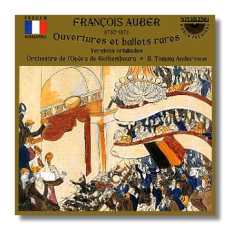
The Internet's Premier Classical Music Source
Related Links
- Auber Reviews
- Latest Reviews
- More Reviews
-
By Composer
-
Collections
DVD & Blu-ray
Books
Concert Reviews
Articles/Interviews
Software
Audio
Search Amazon
Recommended Links
Site News
 CD Review
CD Review
Daniel-François Auber

Overtures
- Jenny Bell
- L'enfant prodigue
- La sirène
- Vendôme en Espagne: Boléro and Air pour le second ballet
- Le dieu et la bayadère: Overture and #5 (Ballet)
- La Muette de Portici: Ballet
Gothenburg Opera Orchestra/B. Tommy Andersson
Sterling CDS-1039-2 DDD 64:25
François Auber's most famous work is the opera Fra Diavolo, lampooned by many, including Laurel and Hardy, in the first third of the 20th century. Nothing from that work appears on this CD. Andersson, however, conducts a tantalizing array of Auber's music here, and Fra Diavolo is not missed!
Bo Hyttner, the executive producer of this recording, has a relative who once made the remarkably apt statement, "Auber is the best of those composers who sound the same." Whether he meant that Auber always sounds the same as himself, or the same as most other composers active in Paris during the middle of the 19th century is not clear, but both possibilities are accurate enough. Anyone who loves Donizetti's comic operas, Adam's Giselle, Meyerbeer, and even Offenbach will have a grand time with Auber's music. The composer, who was born in 1782 and died as late as 1871, gave the Parisian public what they wanted: straightforward tunes, dancing rhythms, and no waiting around for either. Even when the dramatic subject is a serious one, the music smiles, even giggles. The works on this CD get right to the point. Richard Wagner was an acquaintance, and he was mystified by (yet grudgingly jealous of) Auber's skill and popularity. If Wagner only had mimicked Auber's efficiency… ! There's little that's complicated about this music – certainly not emotionally. The phrase about theater for the tired businessman would not gain currency for another century with Broadway's triumph, but Auber anticipated the concept.
By now, you probably know if this CD is for you. If you need additional temptation, consider that most of the music on this CD is appearing on disc for the first time; some of it hasn't even been recorded until now. Andersson successfully walks the interpretive tightrope by taking these confections seriously, but not too seriously. The Gothenburg Opera Orchestra sometimes sounds a little hoarse and rough around the edges, but they play the music sympathetically. Bonuses include extensive notes by Hyttner and Herbert Schneider, and splendid engineering. If you want an understanding of what Paris was like during the time of Chopin, Berlioz, and Bellini (among others), a bar from one of Auber's relatively lightweight diversions is worth a thousand words.
Copyright © 2001, Raymond Tuttle


















